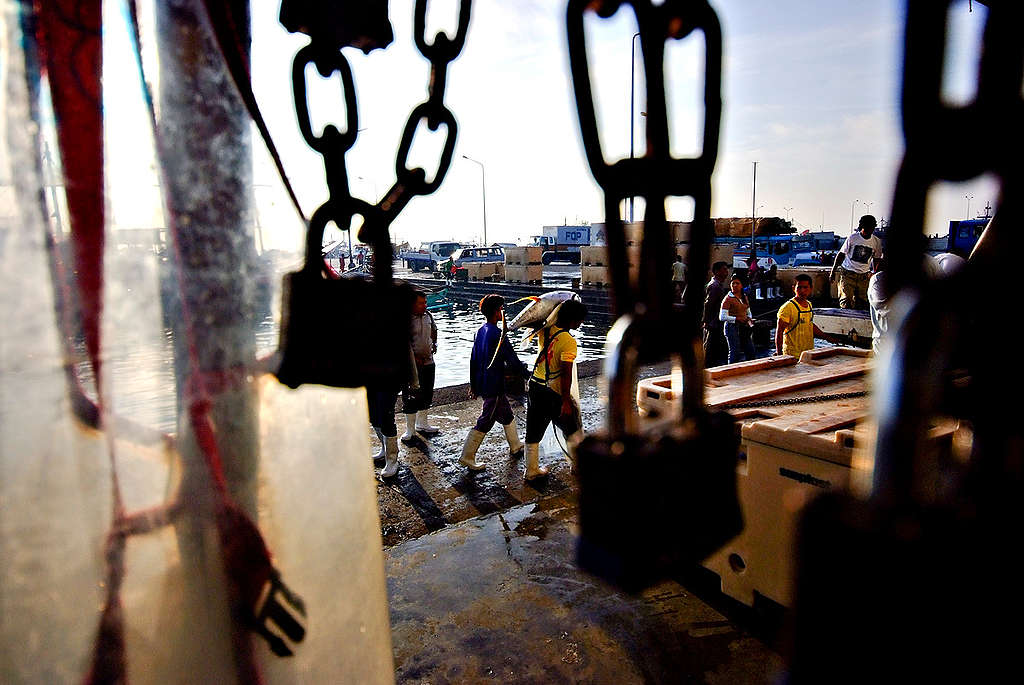MANILA, Philippines — Greenpeace Southeast Asia today urged Philippine-based tuna canneries to step up improvements in their systems and business practices to address issues on labor rights, sustainability, and traceable produce in the industry.

The call came at the release of the latest Greenpeace canned tuna ranking report, which shows that only one out of six tuna canneries surveyed in the country had “good” performance in the aforementioned aspects. The report, titled Sustainability and Justice in the High Seas, also evaluated nine tuna brands in Thailand and five canneries in Indonesia based on a criteria of tuna traceability, sustainability of sourcing, legality and labor concerns, social responsibility, sourcing policy, transparency and customer information, and driving change in the industry.
“Tuna stocks globally are experiencing intense pressure from destructive fishing practices and overfishing,” said Greenpeace campaigner Kisha Muaña. “At the same time, tuna fishing remains an exceptionally high risk industry. Companies must perform stringent due diligence on sustainability and human rights to ensure that the tuna industry is socially and environmentally responsible.”
The top three canneries in the Philippines include Alliance Select Foods International, General Tuna Corp. and Seatrade Canning Corp. Alliance Select Foods International was the only cannery in the Philippines to get a “good” rating, ranking third among the 20 surveyed companies. Meanwhile, General Tuna Corporation, Seatrade Canning Corporation, RD Manufacturing Group, Ocean Canning Corporation, and Celebes Canning Corporation were rated “fair”.
In a span of five years since the first cannery ranking report, Greenpeace noted the companies’ considerable progress towards a more traceable, sustainable and ethical sourcing of tuna. However, measures towards a worker-friendly canned tuna industry that is free of abuse are in desperate need of verifiable time-bound commitments.[1] The group notes that brands and canneries included in the survey have yet to improve on measures related to the elimination of forced labor at sea.[3]
In 2019, a Greenpeace Southeast Asia report exposed the intolerably high number of documented incidents of labor abuse that continue to plague the Southeast Asian tuna industry and the East Asian tuna fisheries that supply many of Southeast Asia’s tuna canneries.[2] An interview with a Filipino fisher, for example, revealed cases of forced labor, mistreatment and abuse.
Greenpeace said these incidents could no longer be overlooked, and seeks a substantial transformation: from fisheries production dominated by large-scale, socially and economically unjust, and environmentally destructive methods, to smaller scale, community-based, labor-intensive fisheries that use ecologically responsible selective fishing technology and environmentally sound practices. International trade in fisheries products should not undermine the legitimate interests of coastal communities, which include protecting fisherfolk’s livelihoods, human and labour rights, or negatively impact food security, especially in developing countries.
In order to achieve this, Greenpeace Southeast Asia strongly urges companies to at least: 1) source from sustainable fishing gears such as pole and line, handline, and FAD free purse seining; 2) adhere to their corporate responsibility to respect human rights as outlined in the UN Guiding Principles on Business and Human Rights[4]; and 3) phase out of at-sea transshipments and consider sourcing from suppliers and from vessels that only spend a maximum of three months at sea.
“Creating a just and quality tuna industry for Filipino fisherfolk and consumers is essential to a better normal beyond this pandemic,” Muana said. “Tuna canneries have a huge role to play in eliminating illegal, unreported and unregulated (IUU) fishing, while ensuring that fishers on board commercial fishing boats are protected from labor abuses.”
Notes to the editors:
[1] Full copy of the report:
https://www.greenpeace.org/southeastasia/press/43789/greenpeace-demands-sustainability-and-due-diligence-on-human-rights-for-tuna-industries-in-southeast-asia/
[2] See the Greenpeace Southeast Asia report, Seabound: The Journey to Modern Slavery on the High Seas, 2019:
https://www.greenpeace.org/southeastasia/publication/3428/seabound-the-journey-to-modern-slavery-on-the-high-seas/
[3] Data from the report shows that:
- 13 (65%) of the 20 companies publicly support the Work in Fishing Convention (ILO C-188) by supporting advocacy efforts and its full implementation
- 11 (55%) of the 20 companies have established measures for the early detection and prevention of modern slavery at sea
- Only 8 (40%) of the 20 companies refuse to source tuna from vessels that collect guarantee deposits from its crew
- Only 7 (35%) of the 20 companies require fishing crew manifests
- A paltry 4 (20%) of the 20 companies have whistleblower and anonymous hotlines or email where affected migrant fishers can file complaints
[4] See OHCHR’s Guiding Principles on Business and Human Rights, 2011:
https://www.ohchr.org/Documents/Publications/GuidingPrinciplesBusinessHR_EN.pdf
Media Contact:
Kisha Muaña, Oceans Campaigner
[email protected]
+63 9190809441
Maverick Flores, Communications Campaigner
[email protected]
+63 9493992604
